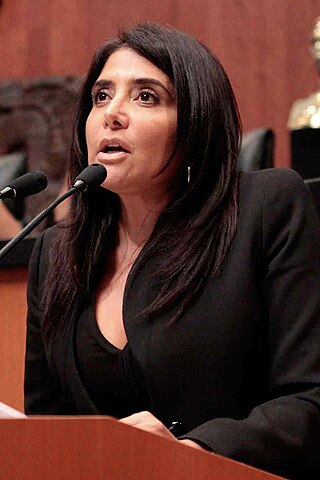
Cuauhtémoc Cárdenas Solórzano is a Mexican politician and civil engineer. A prominent social-democrat and the son of 51st president of Mexico Lázaro Cárdenas, he is a former Head of Government of Mexico City and a founder of the Party of the Democratic Revolution (PRD). He ran for the presidency of Mexico three times, and his loss in the 1988 Mexican general election to Institutional Revolutionary Party (PRI) candidate Carlos Salinas de Gortari had long been considered the result of electoral fraud perpetrated by the ruling PRI, later acknowledged by Miguel de la Madrid, the incumbent president at the time of the election. He previously served as a Senator, having been elected in 1976 to represent the state of Michoacán and also as the Governor of Michoacán from 1980 to 1986.

The Party of the Democratic Revolution is a state-level social democratic political party in Mexico. The PRD originated from the Democratic Current, a political faction formed in 1986 from the Institutional Revolutionary Party (PRI). The PRD was formed after the contested general election in 1988, which the PRD's immediate predecessor, the National Democratic Front, believed was rigged by the PRI. This sparked a movement away from the PRI's authoritarian rule.

Andrés Manuel López Obrador, also known by his initials AMLO, is a Mexican politician who served as the 65th president of Mexico from 2018 to 2024. He previously served as Head of Government of Mexico City from 2000 to 2005.

The Labor Party is a political party in Mexico. It was founded on 8 December 1990. The party is currently led by Alberto Anaya.

Citizens' Movement is a center-left political party in Mexico. It was founded in 1999 under the name Convergence for Democracy, which was then shortened to Convergence in 2002 and changed to Citizens' Movement in 2011.

General elections were held in Mexico on Sunday, 2 July 2006. Voters went to the polls to elect a new President of the Republic to serve a six-year term, replacing then President Vicente Fox ; 500 members of the Chamber of Deputies to serve for three-year terms; and 128 members of the Senate to serve for six-year terms.

The Social Alliance Party, was a center-right humanist political party in Mexico that was founded in 1998 by José Antonio Calderón Cardoso and Guillermo Calderón Domínguez until its dissolution in 2003.
Fobaproa was a contingencies fund created in 1990 by the Mexican government, led by then dominant Institutional Revolutionary Party (PRI) to attempt to resolve liquidity problems of the banking system. The contingencies fund was applied in 1995 during the Mexican peso crisis to protect Mexican banks. In 1998, it was replaced by Instituto para la Protección al Ahorro Bancario, Mexico's current deposit insurance agency.

Pablo Gómez Álvarez is a Mexican politician. He was the president of the Party of the Democratic Revolution (PRD) and has served in both houses of Congress. On 8 November 2021 he was appointed to head the Unidad de Inteligencia Financiera, the country's financial intelligence unit.

The governor of Zacatecas wields executive power in the State of Zacatecas. The governor is directly elected by the citizens, using secret ballot, to a six-year term with no possibility of reelection.

Legislative elections were held in Mexico on 6 July 2003. Although the National Action Party received the most votes, the Institutional Revolutionary Party won 224 of the 500 seats. Voter turnout was only 41%.
Minerva Hernández Ramos is a Mexican politician affiliated with the National Action Party (PAN) who served in the Chamber of Deputies for the LXIII Legislature of the Mexican Congress (2015–2018). She has also served as a senator and made a bid for Governor of Tlaxcala in 2010.

Jacobo Majluta Azar was Vice President of the Dominican Republic from 16 August 1978 to 4 July 1982. He was one of the generations of politicians in the Dominican Republic whose ambition was continually thwarted by the country's labyrinthine power struggles and sectarianism.

General elections were held in Mexico on 1 July 2018. Voters elected a new president to serve a six-year term, 128 members of the Senate for six years, and 500 members of the Chamber of Deputies for three years. It was one of the largest election days in Mexican history, with most of the nation's states holding state and local elections on the same day, including nine governorships, with over 3,400 positions subject to elections at all levels of government. It was the most violent campaign Mexico has experienced in recent history, with 130 political figures killed since September 2017.

Luis Miguel Gerónimo Barbosa Huerta was a Mexican politician affiliated with Morena who served as Governor of Puebla from 2019 until his death in 2022. He was a senator of the LXII and LXIII Legislatures of the Mexican Congress and also served as a federal deputy between 2000 and 2003. He was a candidate for the governorship of Puebla for the coalition Juntos Haremos Historia—formed by Morena, the Labor Party (PT) and the Social Encounter Party (PES)—for the state elections of 2018 and the 2019 special election.

María Alejandra Barrales Magdaleno is a Mexican lawyer and politician and the former president of the Party of the Democratic Revolution. She formerly represented the Federal District in the Senate and also served as a federal deputy and in the Legislative Assembly of the Federal District.
Fidel Demédicis Hidalgo is a Mexican politician. He served as a senator of the LXII and LXIII Legislatures of the Mexican Congress, representing Morelos.
The National Regeneration Movement, commonly referred to by its syllabic abbreviation Morena, is a major left-wing populist political party in Mexico. As of 2023, it is the largest political party in Mexico by number of members; it has been the ruling party since 2018, and it won a second term in the 2024 general election.
Events in the year 1998 in Mexico.

Legislative elections were held in Mexico on 6 June 2021. Voters elected 500 deputies to sit in the Chamber of Deputies for the 65th Congress. These elections took place concurrently with the country's state elections.














